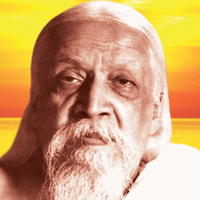Sri Aurobindo
Sri Aurobindo was an Indian philosopher, yogi, maharishi, poet, and Indian nationalist. He was also a journalist, editing newspapers like Bande Mataram.
Sri Aurobindo,, yogi, seer, philosopher, poet, and Indian nationalist who propounded a philosophy of divine life on earth through spiritual evolution.
Aurobindo Ghose was born in Calcutta, India in a Bengali Kayasth family that was associated with the village of Konnagar in the Hooghly district of present-day West Bengal.His father, Krishna Dhun Ghose, was then assistant surgeon of Rangpur in Bengal and later civil surgeon of Khulna, and a former member of the Brahmo Samaj. Aurobindo had two elder siblings, Benoybhusan and Manmohan, a younger sister, Sarojini, and a younger brother, Barindra Kumar (also referred to as Barin).
Young Aurobindo was brought up speaking English, but used Hindustani to communicate with servants. Although his family were Bengali, his father believed British culture to be superior. He and his two elder siblings were sent to the English-speaking Loreto House boarding school in Darjeeling, in part to improve their language skills and in part to distance them from their mother, who had developed a mental illness soon after the birth of her first child. Darjeeling was a centre of Anglo-Indians in India and the school was run by Irish nuns, through which the boys would have been exposed to Christian religious teachings and symbolism. education began in a Christian convent school in Darjeeling (Darjiling). While still a boy, he was sent to England for further schooling. He entered the University of Cambridge, where he became proficient in two classical and several modern European languages. After returning to India in 1892, he held various administrative and professorial posts in Baroda (Vadodara) and Calcutta (Kolkata). Turning to his native culture, he began the serious study of Yoga and Indian languages, including classical Sanskrit.
From 1902 to 1910 Aurobindo partook in the struggle to free India from the British raj (rule). As a result of his political activities, he was imprisoned in 1908. Two years later he fled British India and found refuge in the French colony of Pondichéry (Puducherry) in southeastern India, where he devoted himself for the rest of his life to the development of his “integral” yoga, which was characterized by its holistic approach and its aim of a fulfilled and spiritually transformed life on earth.
In Pondichéry he founded a community of spiritual seekers, which took shape as the Sri Aurobindo Ashram in 1926. In that year he entrusted the work of guiding the seekers to his spiritual collaborator, Mirra Alfassa (1878–1973), who was called “the Mother” in the ashram. The ashram eventually attracted seekers from many countries throughout the world.
The evolutionary philosophy underlying Aurobindo’s integral yoga is explored in his main prose work, The Life Divine (1939). Rejecting the traditional Indian approach of striving for moksha (liberation from the cyle of death and rebirth, or samsara) as a means of reaching happier, transcendental planes of existence, Aurobindo held that terrestrial life itself, in its higher evolutionary stages, is the real goal of creation. He believed that the basic principles of matter, life, and mind would be succeeded through terrestrial evolution by the principle of supermind as an intermediate power between the two spheres of the infinite and the finite. Such a future consciousness would help to create a joyful life in keeping with the highest goal of creation, expressing values such as love, harmony, unity and knowledge and successfully overcoming the age-old resistance of dark forces against efforts to manifest the divine on earth.
Aurobindo’s voluminous literary output comprises philosophical speculation, many treatises on yoga and integral yoga, poetry, plays, and other writings. In addition to The Life Divine, his major works include Essays on the Gita (1922), Collected Poems and Plays (1942), The Synthesis of Yoga (1948), The Human Cycle (1949), The Ideal of Human Unity (1949), Savitri: A Legend and a Symbol (1950), and On the Veda (1956).

Sri Aurobindo
Date of Birth: 15 Aug 1872
Birth Place: Kolkata
Proffession: Indian philosopher
Nationality: Indian
Death: 5 December 1950, Puducherry


